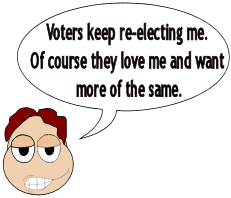Fair Elections Help for Voters
 Want to Discuss Politics? Want to Discuss Politics?
Before starting an argument, think carefully about what would change your mind,
and then ask others what would change their mind. Is there a way you could be an
example for others?
 Can’t Decide Who to Vote For? Can’t Decide Who to Vote For?
Step back and consider the office the candidates are competing for.
-
What are the routine duties?
-
What’s the most important decision or action that might be required?
-
What’s the worst that could happen following a bad decision or inaction?
-
How are decisions usually made in this office?
-
Are others involved in decision making, and if so, how?
-
What knowledge or experience is important for making good decisions?
-
What distinguishes an outstanding officeholder from one who is merely competent?
-
If you could appoint anyone to this office, who would you select and why?
 None of the Above None of the Above
Don’t vote for them - you’ll just encourage them.
Unknown
Sometimes no candidate seems very appealing. Before giving up and not
voting, remember that you are delegating the decision to those who do vote.
Let all the candidates know what kind of person you want to vote for. Ask them
how they plan to represent the interests of people like yourself. Give them a
chance to show you what they can offer. If you don’t get a straight answer,
ask again. Let the candidates and others know you’re not satisfied. If enough
people ask the same questions, it could inspire candidates to shift their positions or inspire others to run.
We get what we ask for, not what we want. What should we ask for?
-
How much should representatives know? Is just having an opinion enough?
-
How should representatives handle conflicting information? How should they decide what to believe?
How should they process new information? Is there a difference between being open-minded and being empty-headed?
-
Should candidates explain how to make their promises a reality? Can they do it alone? If others
must be involved, how could those others be inspired to cooperate?
-
If a representative is committed to a particular issue or course of action,
how should that representative work with others who are equally committed to do the opposite?
-
How far should representatives go to get what they want?
-
How should representatives prioritize issues?
-
Should representatives consider those outside their district who could be affected by a decision?
-
How should representatives balance the opinions of those represented with the representative’s own carefully-researched conclusions?
How much should voters trust the judgement of their representatives?
-
How should representatives treat those who voted for someone else?
-
Your concerns here.
 Afraid of "Wasting" Your Vote? Afraid of "Wasting" Your Vote?

You may hear that a vote for an independent or other-party candidate, or a candidate who is way behind in the polls is "wasted". You
may be told that your preferred candidate has no chance of winning so you should vote for a candidate who could win, even if you really want someone else.
Other voting systems, such as Ranked Choice (Instant Runoff) Voting can eliminate or mitigate problems associated with gerrymandering, and "spoiler" or "long-shot" candidates.
For more on other voting systems, visit our links page.
Step back and think about your goals:
-
Were you consulted by those who declare which candidates are "front-runners"?
-
How many candidates discuss your concerns during the campaign?
-
What if everyone follows the examples set by the "front-runners"?
-
What message do "long-shot" candidates hear about running?
-
What message do winners hear about their chance of re-election?
-
If someone you might really like is considering running, how much support might that potential candidate expect?
-
What message do you want your elected representatives to hear about your own needs and desires?
-
What are the trade-offs between immediate needs and long-term goals?
 What Can One Voter Do? What Can One Voter Do?
The most common way people give up their power is by thinking they don’t have any.
Alice Walker
Something has to change! Those politicians only care about corporations and rich people!
Mommy, how do politicians get elected?
They’re elected by getting over half the votes.
How many votes do corporations have?
Corporations aren’t allowed to vote.
How many votes do political parties and PACs have?
Political parties and PACs aren’t allowed to vote.
How many votes do rich people have?
Rich people have about 1 percent of the votes.
Is 1 percent more than half?
No, half is way more than 1 percent.
Where do the politicians get the rest of the votes?
They get the rest of the votes from ... HUSH CHILD! You’re too young to understand politics!
-
What makes candidates think they can win?
-
Who would you like to see in office and what might encourage that person to run?
-
What could you do to offer that encouragement?
Professor Tangent’s " Let It Begin with Me"
It’s been said that all politics is local. Is there a local candidate, representative or reporter
who might be receptive to any changes or abiding by a pledge if given some encouragement?
What about the candidates who are running?
-
Ask questions, and keep asking until you’re satisfied with the answer.
-
Encourage other voters and journalists to ask the same questions.
-
If you’re at a political event and don’t get a satisfactory answer,
remain standing. Perhaps others will stand with you. If you’re blocking the
view of those behind you, move to the side.
|

